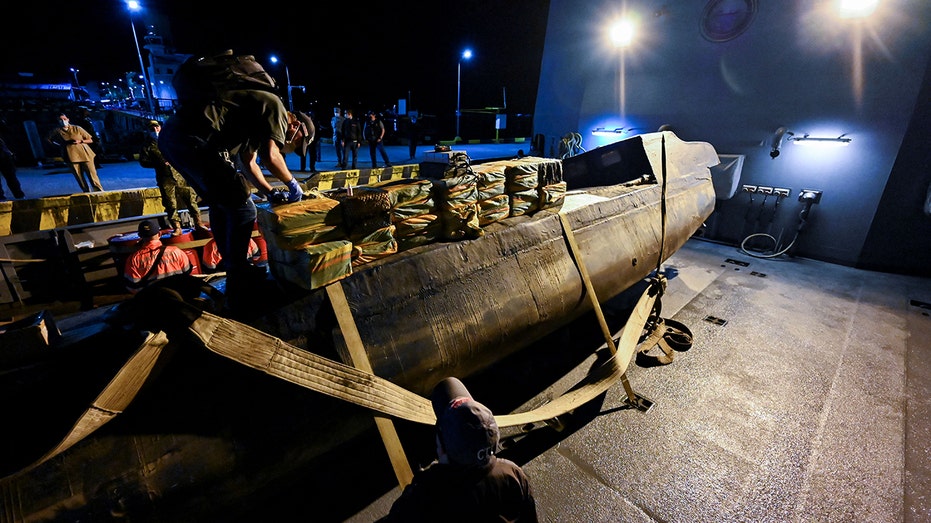Trump Administration Cracks Down on Narcocargo Submarine Network as Cartels Increase US Border Threats
US Treasury sanctions six alleged Colombian and Guyanese traffickers for using narco submarines and aircraft to smuggle cocaine into the United States.

The U.S. Department of the Treasury’s Office of Foreign Assets Control has imposed new sanctions on six alleged drug traffickers accused of orchestrating a global cocaine trafficking network using sophisticated methods, including "narco submarines" and illicit aircraft. The sanctions, announced earlier this week, target two Colombian nationals—Manuel Salazar Gutierrez and Yeison Andres Sanchez Vallejo—as well as four Guyanese citizens: Randolph Duncan, Himnauth Sawh, Mark Cromwell, and Paul Daby Jr. These individuals are accused of moving tons of cocaine from South America to destinations in the United States, Europe, and the Caribbean.
According to Treasury officials, Daby Jr. and Duncan are at the helm of the biggest drug trafficking organizations in Guyana. Investigators allege they employ semi-submersible vessels, often called narco subs, and aircraft to smuggle vast quantities of narcotics. Their operations reportedly rely on the bribery of local government officials, enabling them to move drugs across borders with minimal interference.
Himnauth Sawh, a current officer in the Guyanese police force, is accused of facilitating the passage of Venezuelan and Mexican drug traffickers through Guyana, further integrating the country into international drug smuggling routes. Mark Cromwell, another individual sanctioned, is a former police officer who is wanted by authorities for his role in the abduction of a fellow officer last year—demonstrating the deep infiltration of criminal networks into law enforcement bodies.
The two Colombians, Salazar and Sanchez, reportedly oversee vital airstrips used in the aerial transit of cocaine from Colombia into Guyana, acting as pivotal links between powerful South American cartels and their northern distribution points. This cross-border coordination has made Guyana an increasingly significant node in the international cocaine pipeline.
In conjunction with these designations, all U.S.-linked property and financial interests belonging to the six suspects have now been frozen. Treasury officials emphasized that these measures aim to sever the financial lifelines supporting transnational criminal organizations. “All property and interests in property of the designated or blocked persons described above that are in the United States or in the possession or control of U.S. persons are blocked and must be reported to OFAC,” the statement noted.
The sanctions come amid heightened U.S. efforts to intercept homemade narco subs navigating through Guyana’s dense jungles with record-breaking shipments of cocaine. The country’s geographical proximity to the Caribbean, coupled with persistent concerns about border corruption, has turned it into a crucial corridor for trafficking operations. “Guyana is a close partner of the United States in combating narcotics trafficking,” Treasury stated, while also highlighting the ongoing challenge posed by systemic corruption that hampers anti-drug initiatives.
Recent enforcement actions underscore the scale of the threat. In March 2025, authorities intercepted a cargo vessel off the coast of Trinidad and Tobago that originated in Guyana and was carrying approximately 400 pounds of cocaine. The seized packages bore the Toyota logo—a trademark sign used by the notorious Sinaloa Cartel. Additionally, a major interdiction last year resulted in the seizure of around 5,200 pounds of cocaine from a self-propelled narco sub operating near Guyana’s coastline.
Officials reiterated the commitment to continued pressure on drug trafficking networks. "Treasury will continue to expose the criminal networks that allow for drugs to be trafficked into the United States," Deputy Secretary Michael Faulkender said, pledging closer collaboration with law enforcement agencies in both the U.S. and Guyana to dismantle these organizations wherever they operate. The latest sanctions represent a broader effort to adapt strategies and utilize new legal tools in the fight against global narco-trafficking.




